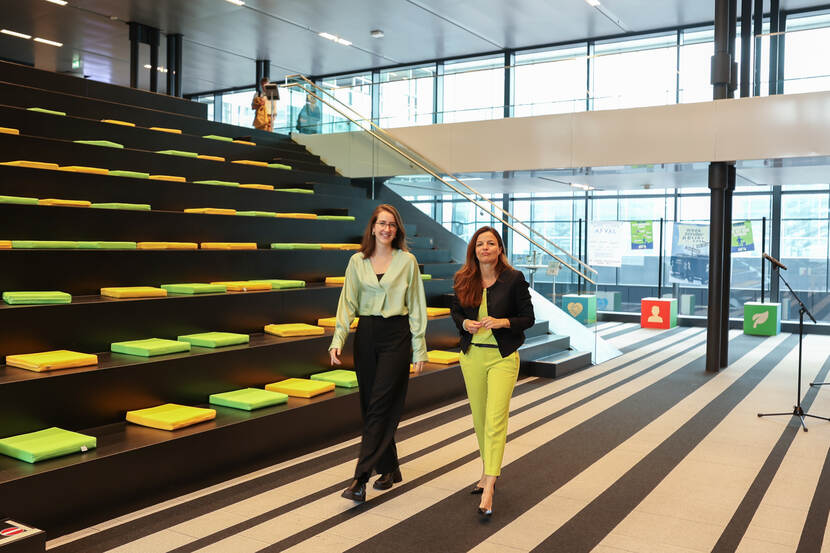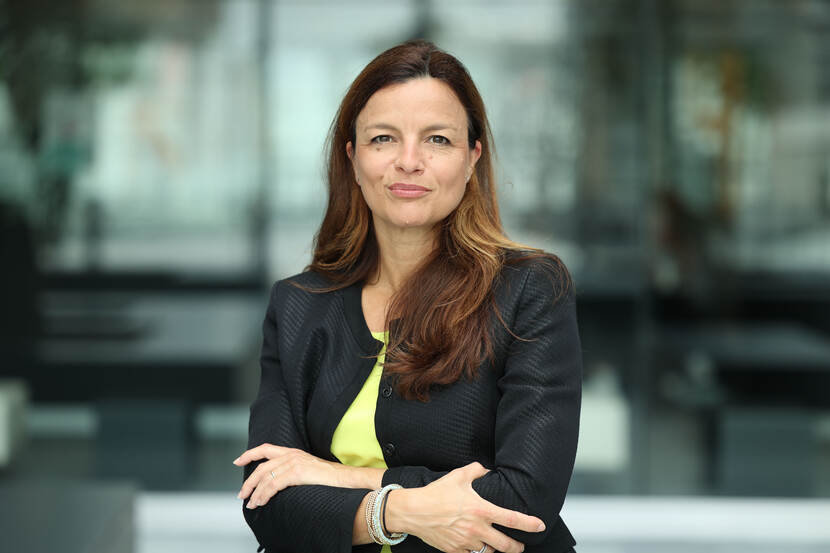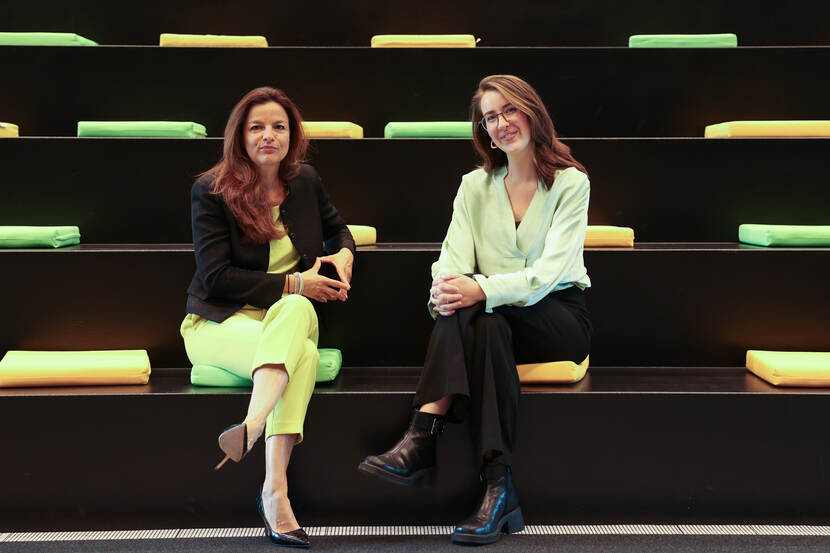Lectures
In collaboration with internal and external specialists, the Academy for International Relations organises various lectures on contemporary themes for all members of staff to supplement its other learning activities. Hind Ribeiro-Bidaoui is a senior advisor and coordinates the lectures for the Academy, together with intern Marijn Maats.
‘The themes touch upon the work performed by our colleagues in The Hague and at the missions each and every day. Lectures are a source of inspiration. During a lecture, you will gain knowledge and insights from external experts, learn more about our policy, meet colleagues involved in the issue, and hear about the practical experiences of colleagues at the missions.’

Current developments
Lectures are an ideal and accessible way to learn about the latest global (geopolitical) developments and the issues that impact the work carried out at the Ministry of Foreign Affairs. Attending lectures helps you do your job even more effectively. Hind and her colleagues and external specialists organised a total of 31 online lectures in 2023. The topics ranged from the elections in Turkey, the war in Ukraine, Africa, and the new geopolitical world order to the impact of the Conference of the Parties (COP), which is the annual meeting of all the countries that have ratified the UN Climate Convention and where all important decisions are taken, as well as the latest situation with regard to the Sustainable Development Goals (SDGs), racism, and the influence of slavery and the colonial past on Dutch diplomacy.
In practice
‘The case histories and the recognisable practical experiences of our colleagues at the missions are particularly appreciated,’ explains Hind. ‘It is precisely those stories of people’s experiences of translating policy into practice and their development at the missions which are extremely useful, and which enable us to do our work properly.’
Close to the fire
Hind continues, ‘Together with the strategic policy advisors (SBAs) from the various regional and policy theme departments, we discussed developments and the course taken by the Ministry of Foreign Affairs during the monthly meeting of the Strategy Board, which is chaired by the Strategic Policy Unit (ESA). As Academy liaison officer, I participate, I provide my colleagues with feedback on the themes discussed, and we assess how we can align our curriculum and the lectures accordingly. Of course, I also follow current events and come up with ideas and suggestions for lectures that complement our curriculum.’

The golden triangle
‘Colleagues now know how to contact us when they have interesting subjects and speakers for lectures,’ Hind continues. ‘In my opinion, a lecture is only complete and successful if there are three guest speakers. They should be an external guest speaker to share knowledge from outside the Ministry of Foreign Affairs and, by doing so, provide a different perspective, a colleague from the Ministry of Foreign Affairs to clarify our policy, and a colleague from a mission to explain how policy is translated into practice and to share their experiences.’
‘I have noticed that colleagues are enthusiastic about contributing to lectures and sharing their expertise and practical experiences with others. During a lecture on the elections in Turkey, Erik Weststrate, Director of the Europe Department, clarified the Hague perspective, and Joep Wijnands, ambassador in Ankara, shared his thoughts on the sentiment and situation in Turkey.’
External expertise like this is indispensable, and that became clear during the lecture on Quran desecrations. A public prosecutor spoke about the relevant Dutch legislation in order to help our colleagues at the missions in Jakarta and Islamabad explain this phenomenon in those countries. What happens in our country has a huge impact on the security of our teams in those countries and puts pressure on the bilateral relationship.
Connection
Lectures are a way for us to reach colleagues across the globe. As we have seen from their reactions, colleagues have expressed a need to get together and discuss current events and developments. An average of more than 100 colleagues participate in each online lecture. The majority of them also turn on their cameras to see each other, and there is always room for interaction, questions, and answers. That reinforces the mutual connections and contact, particularly in the case of staff who work at a remote mission.

Inclusive and accessible to everyone
The lectures are organised for all staff of the Ministry of Foreign Affairs, including our interns, and they also have access to lectures which are relevant for interministerial colleagues in international roles. The lectures take place online at around lunchtime (Dutch time) and last for one hour. ‘That time of the day was chosen deliberately,’ Hind explains. ‘Our colleagues in Asia can then participate at the end of their working day, and our colleagues in North and South America can do so in the mornings, over a cup of coffee. If the guest speakers give permission, we can also record the lectures for internal use to enable our colleagues in, for example, Manila, Sydney, Vancouver, or San Francisco to participate as well. We have also noticed that colleagues find it difficult to fit learning and development into their busy schedules. We hope that the lecture time and the duration we have chosen will enable them to take the opportunity to become inspired and acquire knowledge. Of course, people can also just listen into a lecture while taking a walk. Just as they would so if it was a podcast.’
Technical aspects
‘We are indebted to our partner, Shared Business, for the part they play in making sure that the online lectures run smoothly. They provide all the technical and administrative support and logistics, and they also share ideas during the preparation phase. In addition to that, they advise our speakers and provide didactic advice when it comes to the sequence of lecture and interaction. Shared Business have demonstrated that they are extremely flexible and are capable of working rapidly and of providing a quality service. One example of this is when we jointly organised a lecture at very short notice to mark the anniversary of the Russian invasion of Ukraine,’ Hind explains.
2024
Plenty of inspiring lectures are once again scheduled in 2024. You can look forward to a series of five lectures to mark the 75th anniversary of the founding of NATO, a number of lectures on Mission Sustainable, a lecture on Enhanced Engagement and the intercultural skills needed for this, and lectures on issues in the run-up to the elections in the United States. The Huygens Institute for the History of the Netherlands has interviewed retired ambassadors who were involved in key events and policy developments during the past thirty years. These ‘diplomatic witnesses’, who are rich in knowledge and experience, are also going to feature in our lectures.